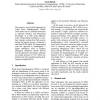Free Online Productivity Tools
i2Speak
i2Symbol
i2OCR
iTex2Img
iWeb2Print
iWeb2Shot
i2Type
iPdf2Split
iPdf2Merge
i2Bopomofo
i2Arabic
i2Style
i2Image
i2PDF
iLatex2Rtf
Sci2ools
112
click to vote
ACL
2006
2006
A Hybrid Relational Approach for WSD - First Results
We present a novel hybrid approach for Word Sense Disambiguation (WSD) which makes use of a relational formalism to represent instances and background knowledge. It is built using Inductive Logic Programming techniques to combine evidence coming from both sources during the learning process, producing a rule-based WSD model. We experimented with this approach to disambiguate 7 highly ambiguous verbs in EnglishPortuguese translation. Results showed that the approach is promising, achieving an average accuracy of 75%, which outperforms the other machine learning techniques investigated (66%).
ACL 2006 | ACL 2007 | Inductive Logic Programming | Rule-based Wsd Model | Word Sense Disambiguation |
Related Content
| Added | 30 Oct 2010 |
| Updated | 30 Oct 2010 |
| Type | Conference |
| Year | 2006 |
| Where | ACL |
| Authors | Lucia Specia |
Comments (0)

